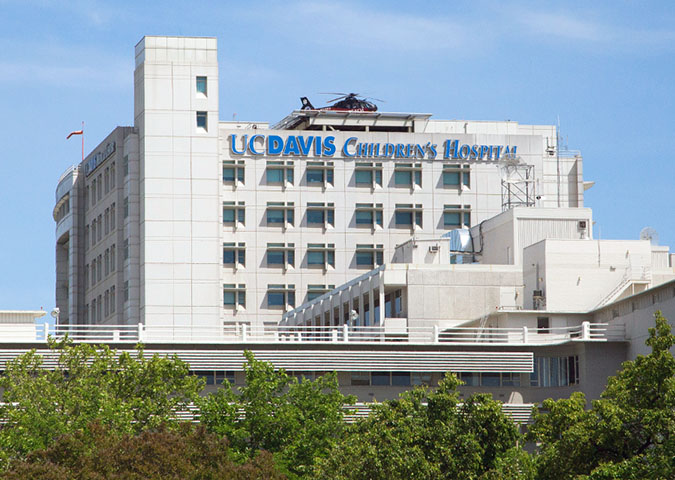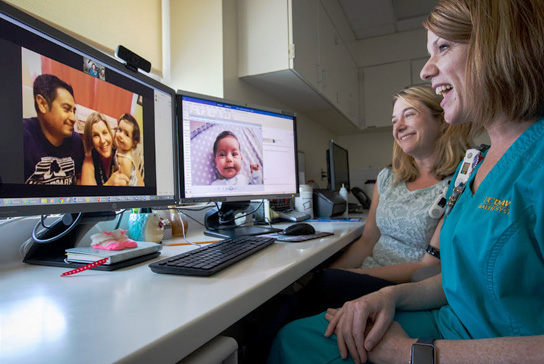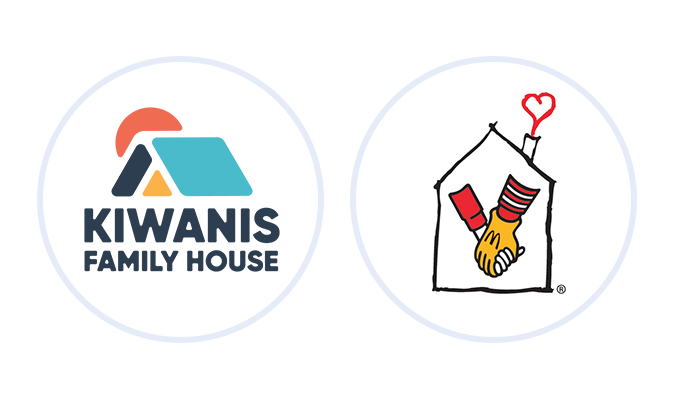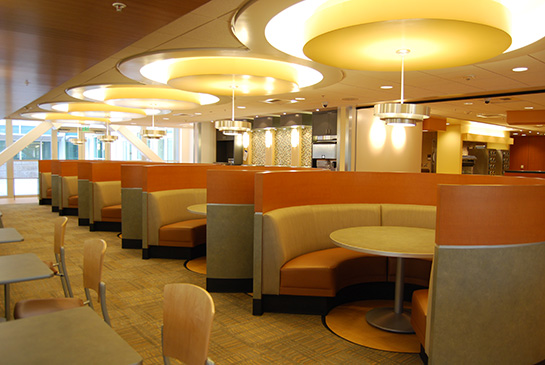To help limit the spread of viruses, we have policies in place for visits to our hospital.
Preparing for your child’s stay
We hope to make your child’s stay at UC Davis Children’s Hospital as comfortable as possible. The following is information to help you and your family prepare for your child’s hospitalization.
When your child is admitted, the admitting nurse will ask you about your child’s health history, including past illnesses and allergic reactions to medications and food. The admitting nurse will measure your child’s height, weight, temperature, pulse and blood pressure. The nurse and physician will perform a general physical exam, which can sometimes include additional tests.
Age determines how and when you tell your child about an upcoming hospital stay. Wait until a day or two before the hospital stay to tell a pre-school child because of his or her limited concept of time. Older children, however, should be given as much notice as possible. They should be encouraged to ask questions and participate in preparations.
Be honest. Answer all your child’s questions clearly and simply with age-appropriate information. You are the best judge of what your child can understand or is emotionally ready to handle. Typically, a child wants to know why he or she has to go to the hospital, how long she or he will stay, where you will be during his or her stay and whether anything will hurt. In answering these questions, avoid negative statements or denial. For instance, if pain is likely, emphasize that medicine will be given to make it feel better.
If your child is critically ill or injured, you may suddenly face this hospital experience with no time to prepare yourself or your child. We know that this is extremely stressful and confusing. We will do everything we can to help you and your child cope. Please remember:
- You are vital to your child as a source of reassurance, comfort and love. You also are an important advocate and spokesperson for your child.
- You are crucial to hospital staff as a source of information about your child’s health history and as a decision-maker in your child’s medical care.
- You may feel scared, angry, exhausted, frustrated, impatient, guilty, helpless and numb. It’s normal and okay to feel these emotions.
- You are not alone. We are here to help you, as well as your child. The hospital and emergency department has a team of social workers and patient navigators that can help support you and discuss resources available to you. Please let us know what you need.

Getting to the hospital
The main hospital entrance and main parking lot are located off of X Street at 4301 X St., Sacramento, CA 95817. Pediatric services at this location include:
- Pediatric and Cardiac Intensive Care Unit (PICU)
- Neonatal Intensive Care Unit (NICU)
- Children’s Surgery Center
- Level 1 Pediatric Trauma Center / Pediatric Emergency Department
- Fetal Care and Treatment Center
View or download our Campus map - UC Davis Health (PDF) and our Hospital Parking Map (PDF).

Clothes, toys and other belongings
We will supply a hospital gown, but your child may feel more comfortable in clothes from home, such as a nightgown or pajamas, robe and slippers.
You also may bring favorite belongings, such as toys, stuffed animals, photographs or a blanket. Please be sure to label personal property with your child’s name.

Medications
Please bring medications and/or a list of medications that your child is taking. After your child is admitted and the medications have been noted on his or her record, please take the medication home.

Food items
As long as your child is on a regular diet, family and friends are welcome to bring food from home. You are welcome to bring food from the cafeteria, located on the ground floor, to your child’s room.

Latex (rubber) balloons
Though colorful and cheerful, these balloons can be a serious safety and health hazard for children and staff, including life-threatening allergic reactions.
Mylar (shiny, metallic) balloons are permitted.

Non-medical electrical items
Check with your child’s nurse first before bringing radios, video games, curling irons or hair dryers to your child’s room.

Valuables
If you cannot afford to replace an item, please do not bring it with your child.
Next to your child’s bed is a call bell attached to a long cord. If you need to call your child’s nurse, simply press the red button and someone will answer on the intercom to determine what you need. Your nurse will be notified.
Your child’s room also has a bedside table, a storage closet, and a chair that converts into a bed. For safety, the bed or crib rails must be raised at all times. The bathroom and showers are for patient use only. Separate bathrooms are available for family members and visitors. A bathtub is also available for your child.
Because education is so important in both prevention and treatment, your nurse is a resource to assist you in understanding your child’s illness and hospitalization. In addition, we offer Closed Circuit Television (CCTV) in your children’s room available 24 hours a day. There are a wide variety of topics you can view.
The hospital serves meals around 8 a.m., 12 noon and 5:30 p.m. A daily menu is delivered to your child’s room that lets you choose what your child will eat the next day. See the dietitian for more details.
If your child is on a regular diet, food also may be brought from home.
For the safety of our patients, the pediatric floor is a locked unit. To enter, you must press the nurse button on the intercom just outside the door. A staff person will assist you with entering.
If your child is 5 years old or younger, or has other security issues, a monitored band (Acetic) will be placed on his or her arm or leg. This alarm alerts staff if patients wearing the bands are near the unit’s exit areas.
Smoking is not permitted inside UC Davis Children’s Hospital or the Medical Center and within 20 feet of any building entrance. Alcohol and illegal drugs are not permitted. Because of our concern for the safety and health of our patients, staff and visitors, the medical center is entirely smoke-free – inside and out – a policy which began July 1, 2008.
Pavilion pharmacy
Located in the Pavilion on the first floor of the hospital (Room 1P175).
8 a.m. – 7 p.m. weekdays
9 a.m. – 6 p.m. weekends and holidays
Phone: 916-703-6100
Cafe dining options
Our cafeteria, located on the hospital’s first floor, is open seven days a week from:
6 a.m. – 8 p.m.
11 p.m. – 12 a.m.
1 – 4 a.m.

To keep families connected and help promote your child’s health and healing, family members can now join in on video visits with patients at the hospital and their patient-care team.
When trying to stay connected with friends and families through any health care journey, social networks can make communication easier. The greatest source of support can be your family and friends. Many resources are available to share your story and your child’s progress, while keeping your information and your social media communications protected. Below are some suggested sites and ways to stay in touch.
Caring Bridge
Create a personal Caring Bridge website to share health updates, photos, and videos with the people who care about you.
- You are able to select the privacy settings (private or public)
- Your personal website is designed to seek support from your family and friends, and provide updated information on your child’s progress
Facebook Groups
Create a personal page or group for your child’s health journey to share information, updates, and/or photos.
- Members can be added or deleted at any time by you as the creator of the group
- You are in control of the privacy settings
- Closed group (only those invited by group members can join)
- Secret group (only those in the group can see the page)
- Open group (public page)
Meal Train
Create a personal page to organize your family’s needs.
- Family and friends can sign up to provide meals to your family at times that are convenient for you
- Each Meal Train has a unique web address for you to share
- Only those with that address will have access to participate
- Options for organizing multiple meals, rides, childcare, household chores, etc.
Please know that our staff is encouraged to not participate on social media sites with their patients and their families. Although you may develop strong relationships with the staff caring for your child, this keeps in line with the UC Davis Health social media policy.
In the pediatric unit, each patient’s bedside has a telephone with its own number, which is posted in the room. When calling from outside the hospital you may dial this number directly between 8 a.m. and 10 p.m. You may also call 916-734-2011 and ask for your child’s room.
If you wish to speak to your child’s nurse, you may dial the nursing unit directly at 916-703-3070. Patient information is considered confidential and will only be given to the parents or legal guardians of the hospitalized child. Please explain this to other relatives and family friends.
In-hospital dialing
- For local calls in the 916 area code, dial “9” plus the number.
- For toll-free calls, including 800, 888, 877, dial “9” plus “1” and the toll-free number.
- For long-distance calls, when calling collect, dial “0” and wait for an operator.
Your child will enjoy receiving mail from friends and relatives. Send them to:
Your Child’s Name
Davis 7 Pediatrics
UC Davis Children’s Hospital
4301 X Street
Sacramento, CA 95817
Lodging
If you are from out of town, you may be eligible for low-cost lodging at the Kiwanis House or the Ronald McDonald House, located on the grounds of the UC Davis Children’s Hospital. A Courtyard by Marriott is walking distance from the hospital and offers discounted rates for the relatives of hospitalized patients. For more information about these accommodations, please call Social Services at 916-734-2583.

Visitor policies
To help limit the spread of viruses, we have policies in place for visits to our hospital.
Hospital guides
Our guides provide a helpful overview of key services and information.



